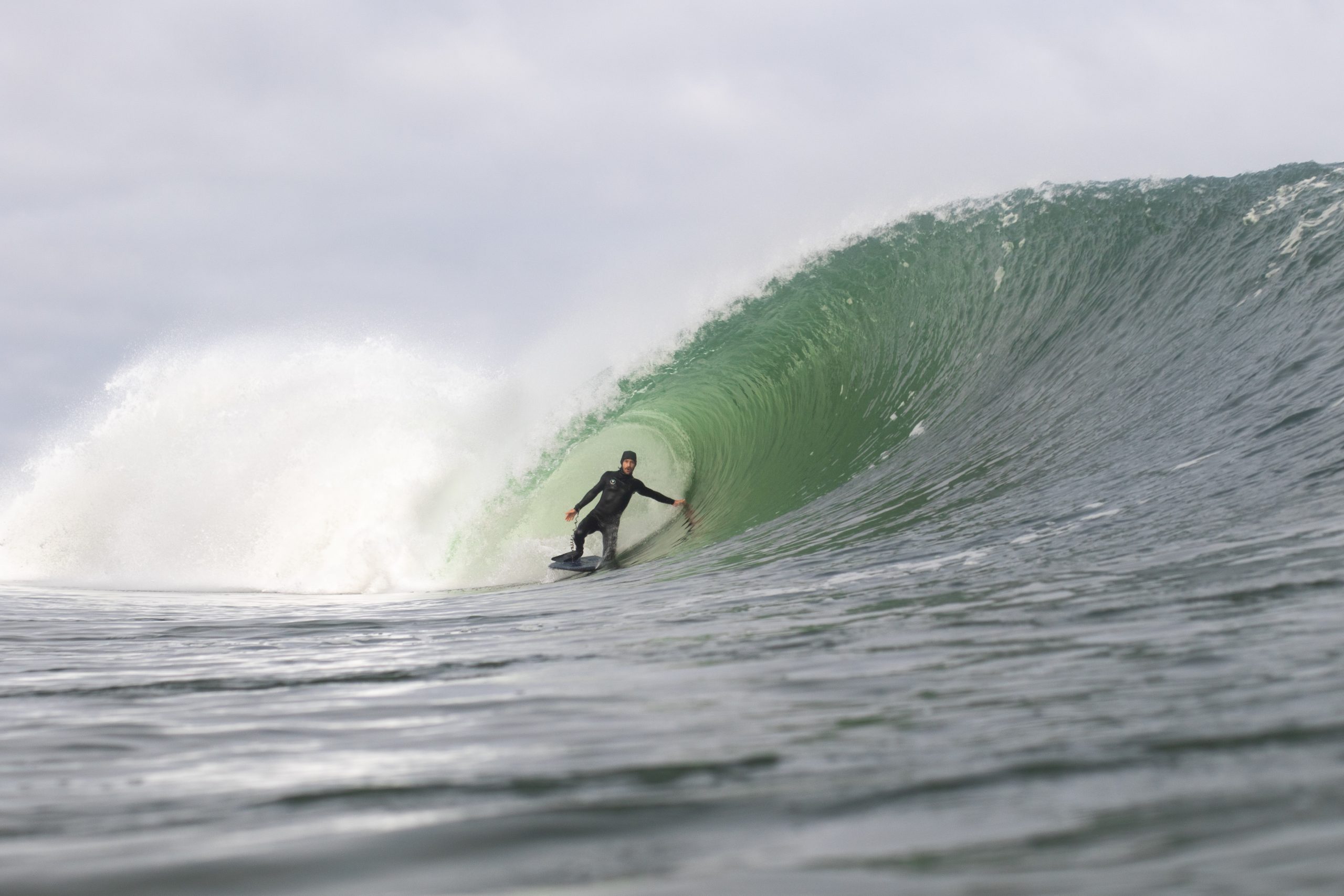
Howzit, bru! Welcome to South Africa Surf Tours’ Strike Mission planning guide for Skeleton Bay Namibia. We’re stoked to have you on board, and hope this information is going to have you charging the Donkey real soon. Our goal for this guide is to give you all of the information, tips and tricks you need to plan the surfing strike mission of a lifetime.
As a guided surf tour specialist, we offer fully-guided surf trips to the world’s best wave- Skeleton Bay Namibia. Since launching a few years back – we’ve had a large increase in the number of people wanting to surf Skeleton Bay.
Unfortunately as a small business, this meant us being fully booked and having to turn people down throughout the Skeleton Season in 2019. Not being able to help these guys and girls realise their dreams of a minute-long barrel sucked. That’s why we decided to put together a guide that helps surfers from across the globe to plan & execute their own Skeleton Bay strike missions in an affordable, informed way.
This guide is not sponsored by the companies and places we recommend – it’s purely through research and our own experiences that we can recommend certain places and provide the following information.
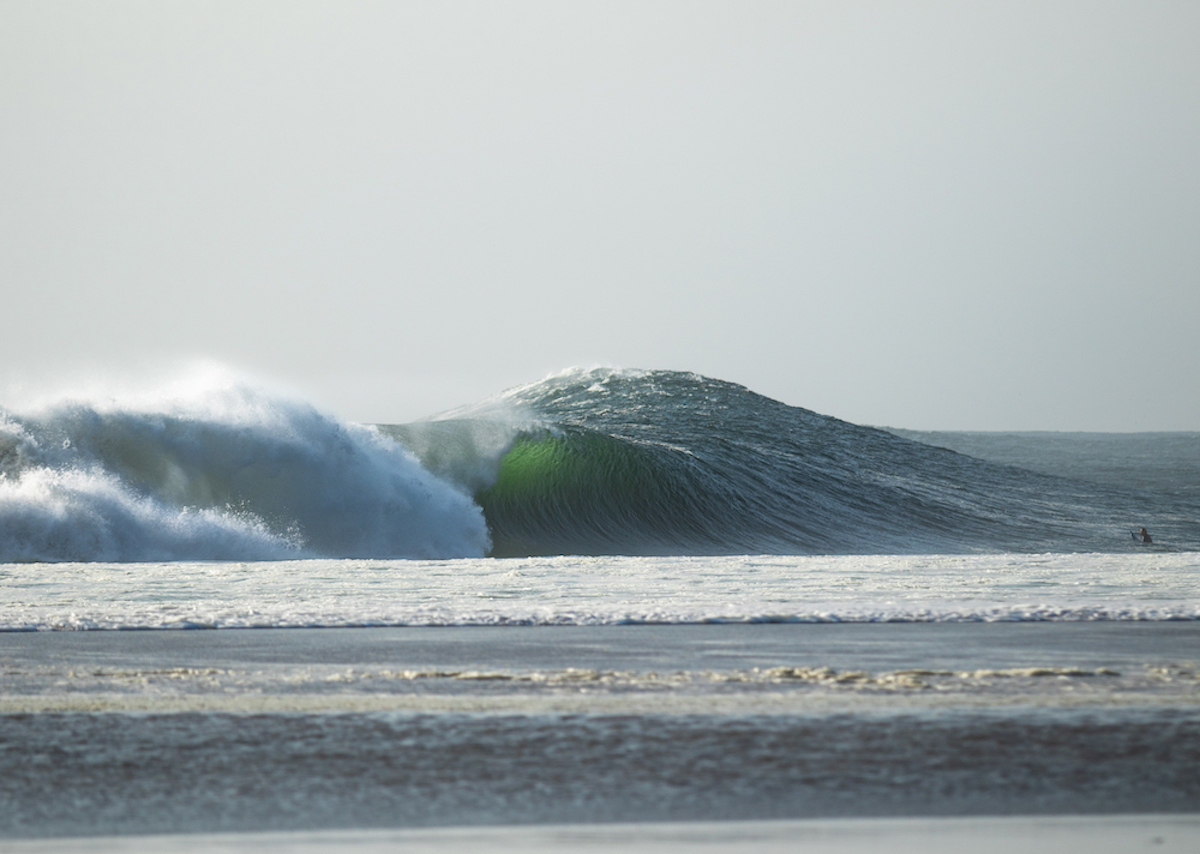
It’s a big commitment – dropping anything you have going on and jetting to the middle of nowhere on the fly. We get it. But let us tell you this, it’s one hundred percent worth it. If you go on the right conditions, with the right crew, and the right mindset, you’re in for a life-changing experience. It’s the kind of surf trip you’ll be telling your grandkids about one day.
That being said, there is quite a bit of small print involved in planning and executing a last-minute Skeleton Bay strike mission. It is an extremely fickle wave, and not an easy one to get to. We’ll take you through each step of the planning process to make it easier.
First and foremost, you’ll need to keep a close eye on surf forecasts and swell patterns between the months of May and September, then cross-reference surf forecast websites, and talk with other surfers to get more opinions on whether or not it’s worth going. Lastly, sign up and keep an eye out for our swell alert in your email inbox.
As we have said, this wave is very fickle when it comes to the swell size and direction. It only starts working once the Southern Hemisphere starts moving into the winter months (May – September) and then it needs a big long-period groundswell to wrap in at just the right angle. If the swell isn’t big enough, Skeleton Bay doesn’t break. And when the swell does get big enough, it usually only lasts for a short time, maybe up to two days, sometimes three days if your karma is very, very good.
You’re going to want to keep an eye out for really big, SW to W (the more West the better) swells. Luckily, these are easy to identify on synoptic weather charts. Just look for big, dark bubbles smashing into the West Coast of Africa. Don’t consider anything smaller than 3 metres on the charts. You’re looking for a sweet spot of the right direction coupled with a big enough swell.
We use the following forecast websites or apps when making our decisions:
This is our go-to surf forecast website. We find that it’s the most consistent when predicting swell conditions and size. It’s been our go-to over the last seven years, and we trust it more than any of the others. (Personal preference).
Check Donkey Bay and Swakopmund’s charts regularly over the Skeleton Bay season – this gives you a good indication of what to expect. Here are the quick links to both:
Magicseaweed gives you a bit more detail than Windguru does (it gives you a better breakdown, graphs and synoptic charts). Their predictions tend to fluctuate a bit more than Windguru’s do. This puts a bit of doubt in your mind when you’re making a last minute call. It is, however a good option to fall back on in case Windguru tweaks out for some reason.
On Magicseaweed, you’ll search for “Skeleton Bay”, and not Donkey Bay. Here is the quick link: Skeleton Bay
We also use the Windy App when looking at forecasts. Download the app here and navigate to ‘Swell’ – here, you’ll see a live swell chart. This gives you a good indication of the live tracking of a swell as it changes hourly and daily. Look at the wave itself (pinpoint the location of the wave).
Just a note that you have to pay for the extended forecast. Their plans start at $7.99 per month. It gives you a good indication of what is coming, and is useful for advance planning. We don’t recommend making the decision to go further than a week in advance, though. Our weather fluctuates and changes often, and it’s something you need to take into consideration. Particularly for Skeleton Bay Namibia.
Here is the quick link to Surfline’s Skeleton Bay surf report.
We have found that it’s best to cross-reference between a couple of websites. Also, it’s always good to chat to other people and get their opinions on the conditions.
Even easier? Sign up to receive a ‘swell alert’. We send one out whenever we see something promising on the horizon. You will receive a direct email to your inbox. We generally send out an orange light swell alert 5-7 days before the swell hits, and confirm with a green light alert 72 hours beforehand.
Now, for the most important part: How to get to Skeleton Bay Namibia. The nearest airport to Skeleton Bay is Walvis Bay International Airport in Namibia. The airport is located in the dunes of the Namib desert, about 15 minutes drive from the harbour town of Walvis Bay.
It’s a small airport, and flights in and out are fairly limited and only arrive in the afternoons (the earliest flight arrives at 12:40pm via SAA). You’ll want to fly into Walvis Bay airport at least 1 or 2 days before the swell is due to hit (or as early as possible, once you’re sure the conditions are here to stay). This will give you enough time to organise your vehicle, check into your accommodation, familiarise yourself with the small town, get a solid feed in and rest before a massive few days of waves!
The cold current creates a thick fog that blankets the coast for most of the year, which can sometimes interfere with flights landing on time. This year there were a few flights that diverted to Windhoek as a result of the fog, which unfortunately meant a few guys missed out on the swell. Try and arrive earlier if possible, to give yourself a bit of extra time as a buffer for unexpected delays.
Depending on where you are traveling from, you will arrive via Johannesburg or Cape Town International , or Windhoek Airports.
There are three main airlines that operate in Walvis Bay International Airport:
The OG of Namibian airlines, Air Namibia is generally the cheapest option for flying in and out of Walvis Bay. Be sure to book directly on this airline’s website:http://www.airnamibia.com/plan-book/ . Don’t get tricked into extra fees through intermediate companies (we’ve done it, and it’s so unnecessary).
Your excess baggage charge will depend on how many boards you’re travelling with (your board bag’s weight). It’s recommended to bring at least one extra board along, more if possible. Skeleton Bay is known as a “board-eater” – many a surfer has left with less boards than they arrived with. On Air Namibia, surfboards up to 2m are considered checked baggage. If you are charged additional baggage fees due to being overweight, it will be charged according to the table below.
Check out our packing section for tips on packing & traveling with your surfboards.
There are only two or three Air Namibia flights into Walvis Bay daily. One arrives at around 14:20pm, and the other one or two at around 15:10pm. Try and get onto one of these flights that arrives the day before, or two/ three days before the swell is due to hit.
SAA is a slightly more luxe airline than Air Namibia. Bonus? They often upgrade you to business class as a result of overbooking at no extra fee – its balling. Here’s the direct link to their website: https://www.flysaa.com
Surfboards are not subject to an excess fee as long as the additional piece of baggage weighs no more than 23kg with a maximum dimension of 200cm. Excess baggage charges vary according to where you are flying in from. You can check your fee here.
There are only two SAA flights into Walvis Bay daily. One arrives at around 12:40pm, and the other two at around 14:15pm. Try and get onto one of these flights that arrives the day before, or two/ three days before the swell is due to hit.
Another option is South African Express: http://www.flyexpress.aero. These flights arrive at Walvis Bay International Airport twice a day. One flight arrives at 14:15pm from Johannesburg and another at 13:15pm from Cape Town.
Surfboards are not subject to an excess fee as long as the additional piece of baggage weighs no more than 23kg with a maximum dimension of 200cm. Excess baggage charges vary according to where you are flying in from. You can check your fee here.
Last minute flights are always more expensive. Unfortunately due to the fickle nature of the wave, last minute bookings are your only option (unless you’ve got time to kill waiting in Walvis Bay for the swell to hit).
Here are a few tips for finding the cheapest last-minute flights:
Flights into Walvis Bay tend to be booked up pretty quickly when there is a good swell forecast. As a last resort option (if you can’t get a flight into Walvis Bay), you could consider flying into Windhoek International Airport. The drive between Windhoek Airport and Walvis Bay is around 5 hours long.
*NOTE: The baggage allowances & fees mentioned above are controlled by the respective airlines & are subject to change. These were the charges as stated online & confirmed via telephone in 09/2019.
Not sure whether you need a visa to visit Namibia? Most US citizens are exempt, but it is best to be sure. Luckily the Namibian consulate is very efficient. Use this article ‘A quick guide to Namibian visa requirements’ to determine if you need a visa, or contact the consulate directly using the details below:
Namibian High Commission Office
+27 12 481 9100 (Call between 8am – 4:30pm Monday to Friday)
Click here for a list of the Namibian visa requirements
So you’ve made the call, booked your last minute flight, and finally made it to Walvis Bay International Airport, Namibia. Good on you, bru! Now what?
You’ll have to arrange a car rental, of course. You’re going to need to get from the airport to your accommodation, and from your accommodation to the wave and back every day. You might also want to check out some restaurants/ shops/ nearby activities in between surf sessions.
Much like everything else when planning a strike mission to Donkey Bay Namibia, there’s a trick to the car rental aspect of the trip. A regular light-weight passenger (non 4×4 or all-wheel drive) vehicle isn’t going to get you to the wave. We’ve seen way too many Polo Vivo’s stuck on that beach. You’ll need a 4×4 or all-wheel drive, and some decent driving skills to get to the wave without getting stuck in the soft sand.
You can use one of the major car rental companies based at the airport itself. We recommend booking a car before you arrive, due to limited availability. You don’t want to get there and all of the 4×4 or all-wheel options are booked out. We’ve had a friend hitch-hike to the wave, but you might not be as lucky as he was.
Rental car kiosks can be found near the baggage claim at the airport. Below, you’ll see a list of car rental providers in Walvis Bay.
Below, we’ve conducted a basic price comparison of the major car rental companies, based in USD.
The drive from Walvis Bay International Airport to the CBD is 17 kilometres, and will take around 18 minutes to make the journey. After picking up your car hire, follow the signs to the M36. Take the motorway east towards the city and follow it right to the end of the road. Turn right at the roundabout onto B2, then take Sam Nujoma Avenue to Khomas Hochland Street in the CBD.
A good night’s rest is essential on a Skeleton Bay strike mission. Your body will feel broken after a full day of surfing, and a comfortable bed will be more appealing than ever.
Luckily, there are quite a few accommodation options available, and there are more popping up as the town becomes more popular for business and leisure travellers. A good place to start, as with any trip is to look at Airbnb or Booking.com.
You’re going to want to look for something close-ish to the wave, but also not too far from shops/ restaurants in the ‘CBD’. Bear in mind that any accommodation will be at least a 30 minute drive from the wave, as the town is situated around 30km from the wave itself. The harbour area is also a good option, if you can find something in your price range that is near the lagoon. This part of the town definitely has the most holiday-ish vibe, while other areas can feel a bit industrial. Don’t expect Indo-esque tropical conditions and white sand beaches.
Pricing ranges anywhere from USD 20 to USD 200+ per person per night.
Look for anything between the harbour, and the start of the town (Meersig area):
Depending on the size of your group, you can look at renting a house on AirBnb and sharing the cost per person.
Camping isn’t advised. We’ve done this before, and it sucked. The wind gets incredibly strong, and even with a 4×4 to shield your tent, you’re going to struggle. It’s worth paying the extra cash & driving a bit further to get a decent night rest after a solid surf day.
When looking for accommodation, it’s important to look at Walvis Bay specifically, and not Windhoek/ Swakopmund etc. You don’t want to be driving over an hour each way every day. Unless you have a surf guide like Salty Jackal in Swakopmund to drive you.
Below, we’ve listed a few of the good accommodation options to suit any budget. There are loads more to choose from online, though. Just type ‘Walvis Bay’ into Booking.com or Airbnb.
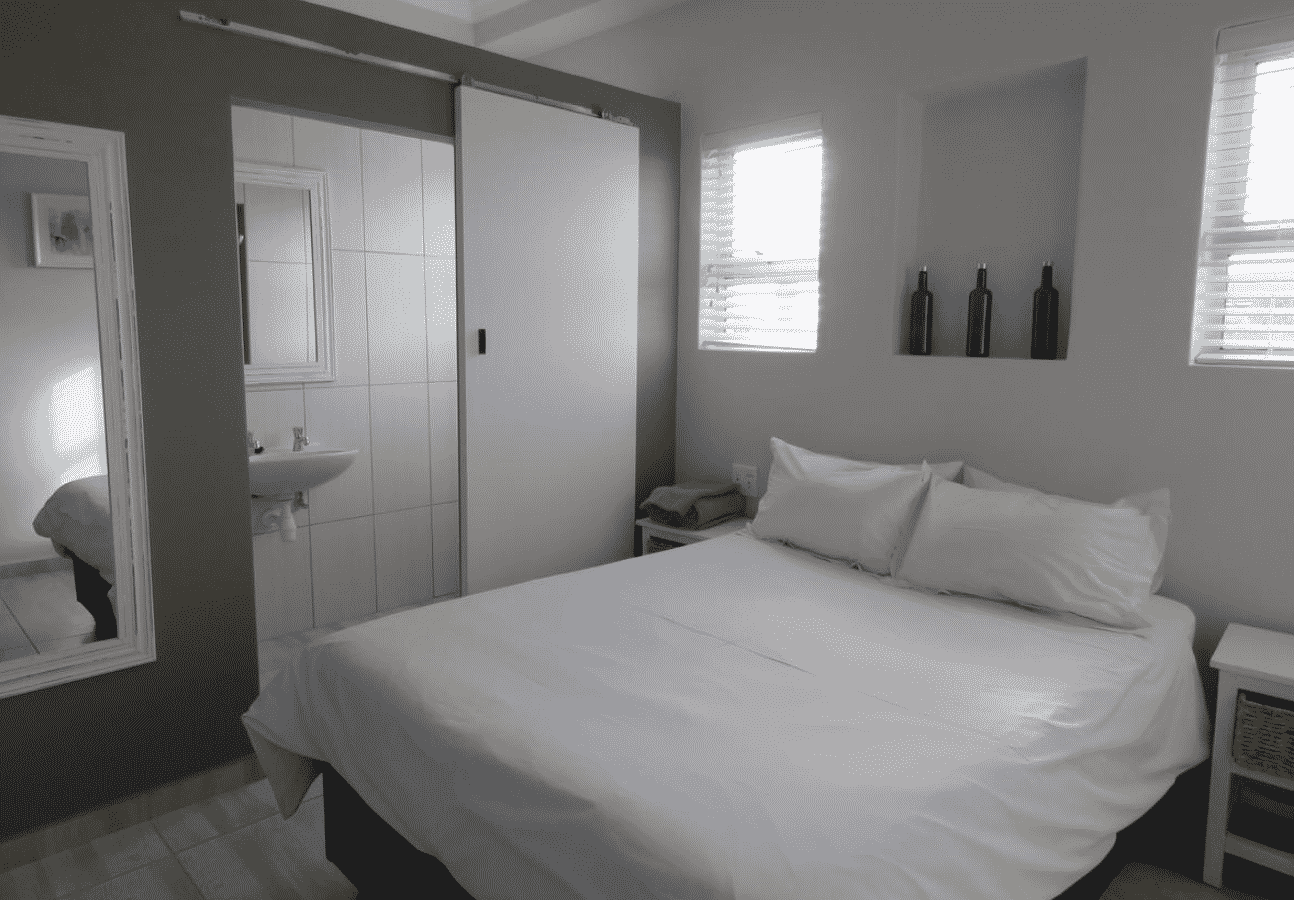
This is our go-to affordable & comfortable accommodation option. Many wave-riders choose to stay at Lagoon Chalets on their Skeleton Bay strike missions. It is walking distance to the lagoon, and a short drive from shops and restaurants. There is also an on-site restaurant, and laundry services.
The chalets and town-houses are clean and neatly decorated. We usually book a 3-bedroom townhouse with its own kitchen, lounge & entertainment area for chilled post-surf evenings with friends.
Click here to download their price list.
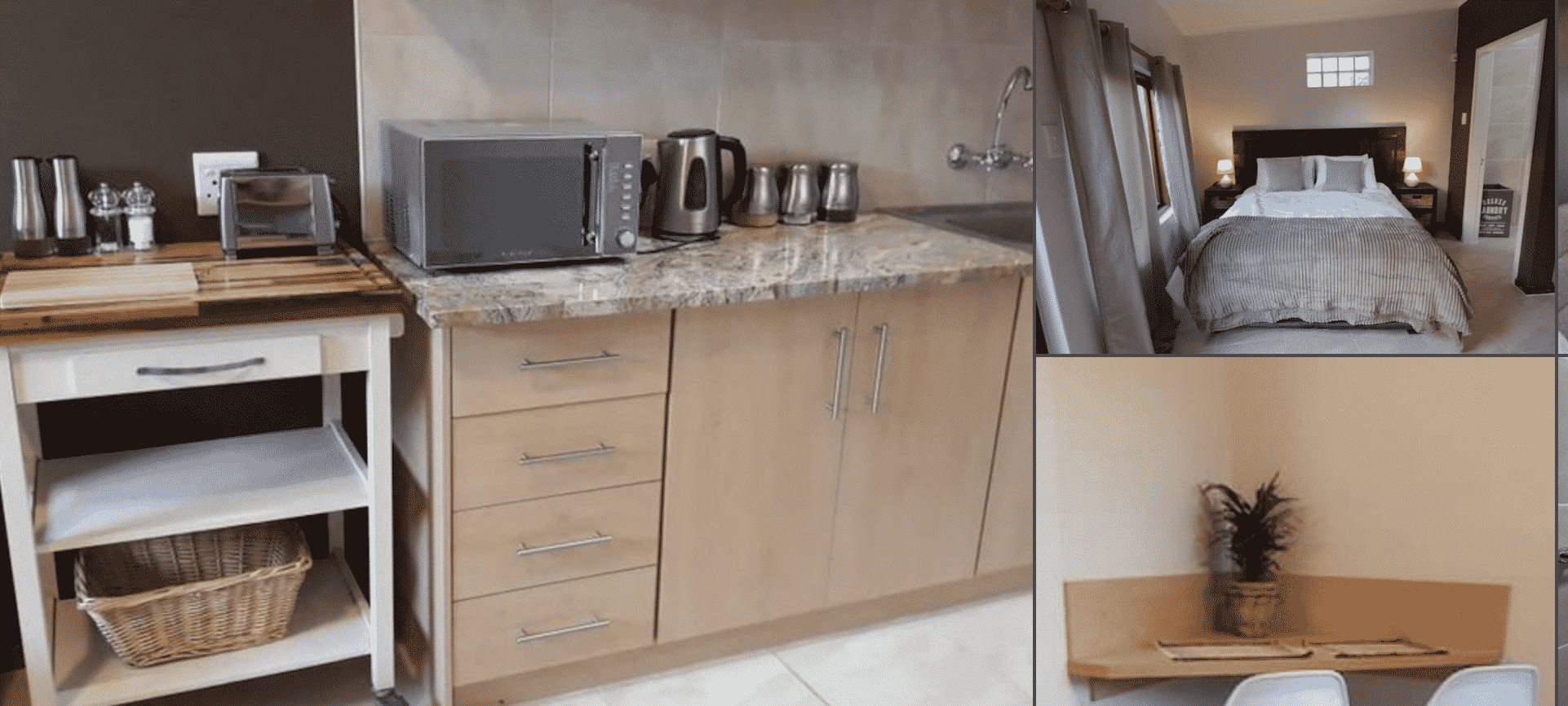
We found this cute cottage on Airbnb last time we visited. It’s near the harbour and the lagoon. The owner is super friendly, and the accommodation is simple but comfortable and clean. Perfect for a couple/ solo traveler. The price is R400 per night (USD 27) – so very affordable.
Here is the link to their Airbnb listing.
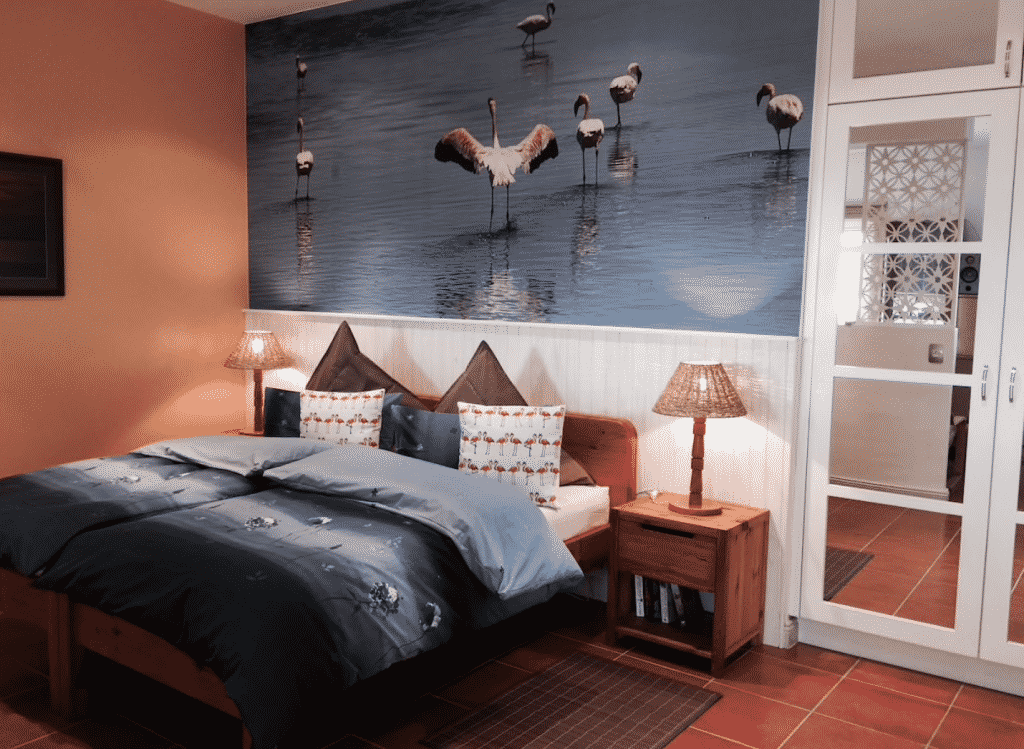
This is a one bedroom, one bathroom apartment that overlooks the lagoon. The infamous Walvis Bay flamingoes hang out at the lagoon & feed there in the evenings – it’s a pretty incredible sight. Breakfast options at moderate prices are available in the nearby hotel and lodge, just a few steps away from the studio. Averaging at about USD 45 per night (and no other cleaning fees etc.) this is an affordable & slightly more luxe option.
Here is the link to this apartment on Airbnb.

This is a pretty sick option for accommodation. It’s a very comfortable one bedroom, one bathroom apartment. The location is good – just 5 minutes walk from the famous Lagoon and 1.7 km from Pelican Bay Viewpoint. It’s also near to the shops and restaurants in the town.
Priced at around USD 65 per night, it’s one of the slightly more expensive options – but offers extra comfort & a good location.
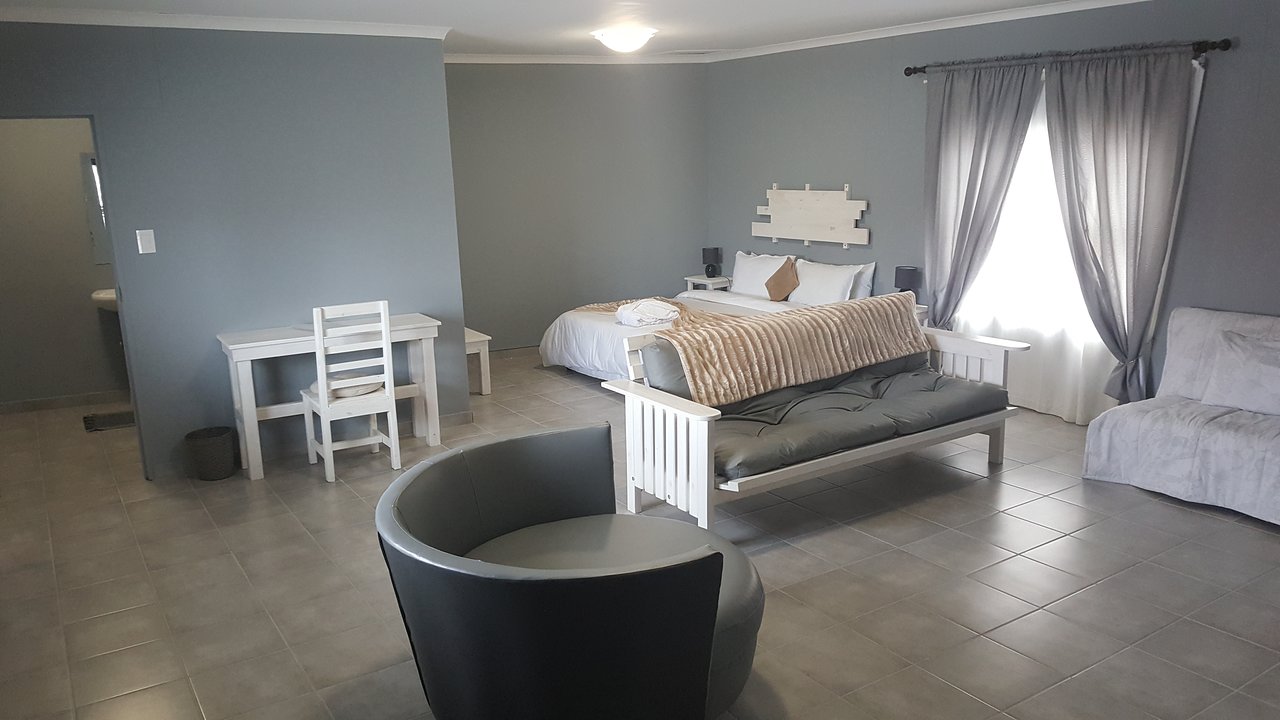
At around USD 85 this is a comfortable option with a good location, near the lagoon and town. Click here to read more about it.
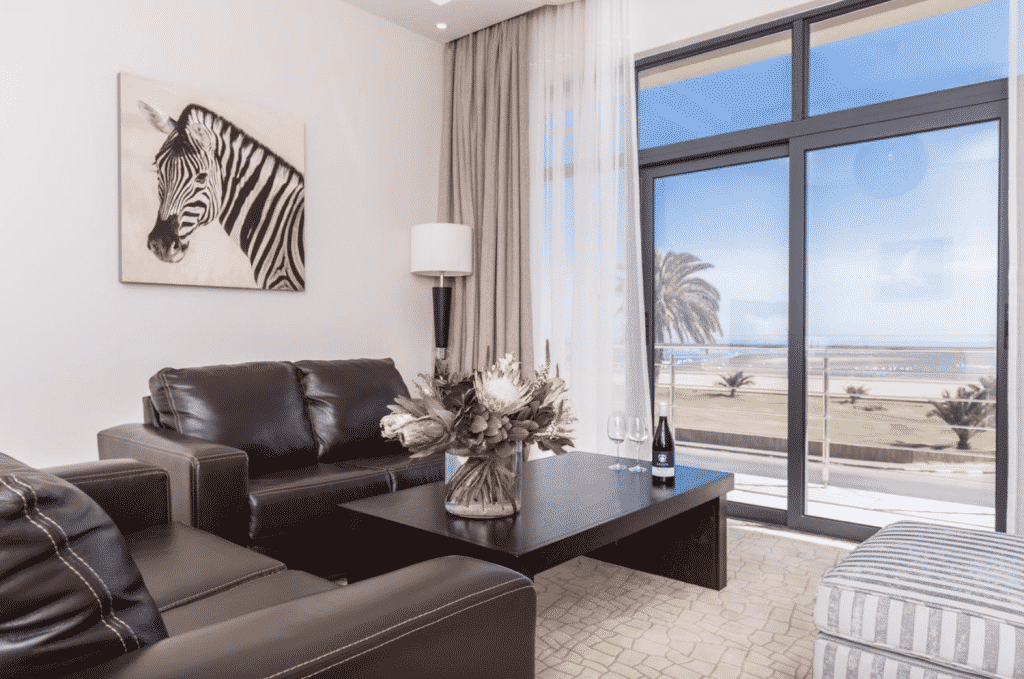
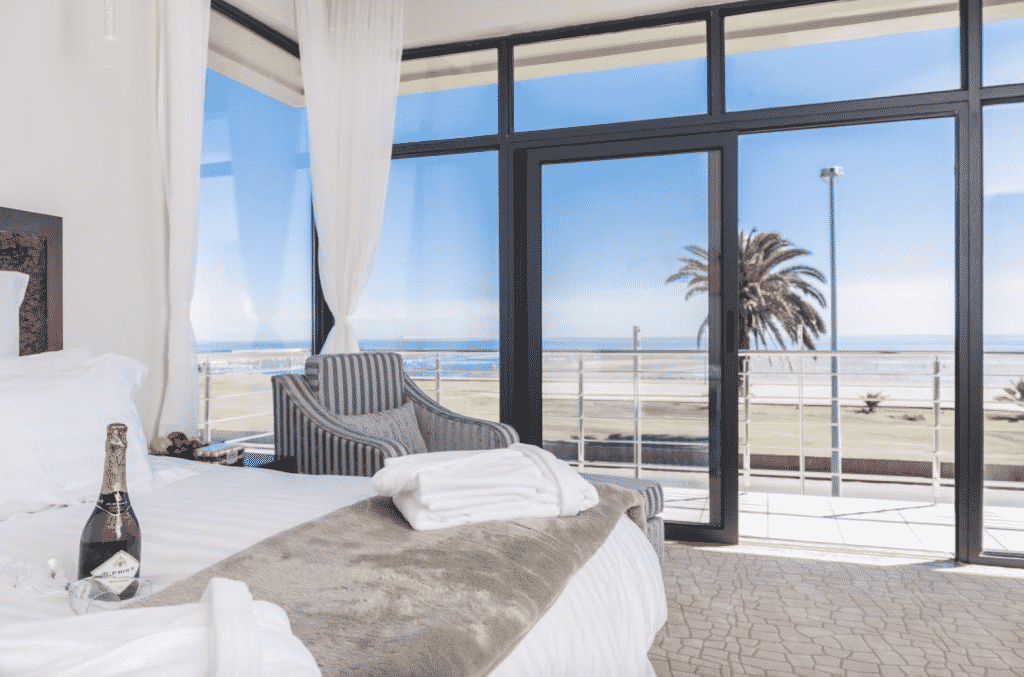
Known for it’s helpful and friendly staff, Flamingo Villas Boutique Hotel is a more expensive but beautiful option. It’s located right on the lagoon, in Meersig. The price per night is around USD 135.
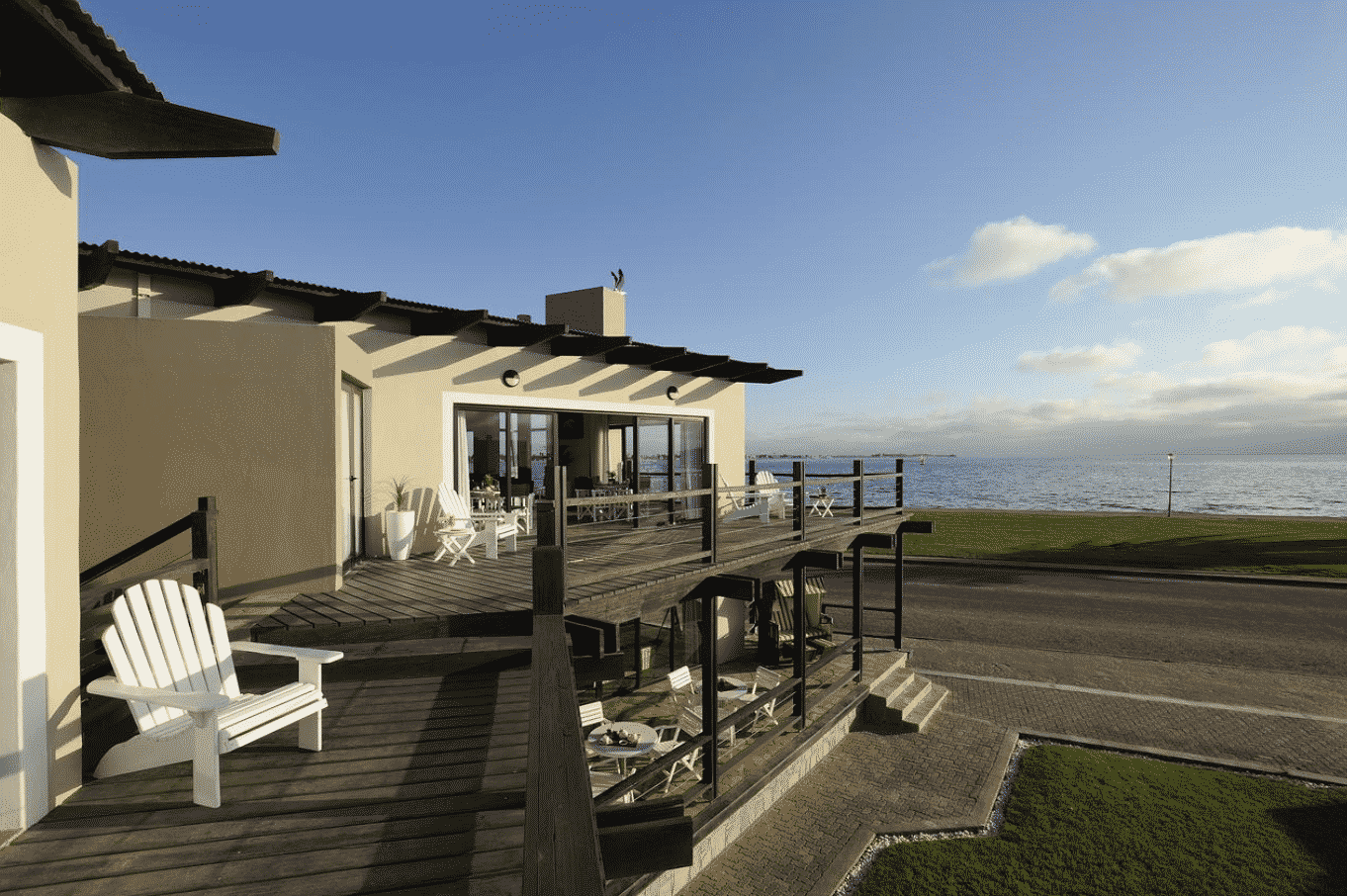
Situated directly on the Walvis Bay Lagoon, the Oyster Box Guesthouse offers a large sun terrace and lounge with panoramic views. The price is around USD 70 per night, making it one of the more affordable luxury options.
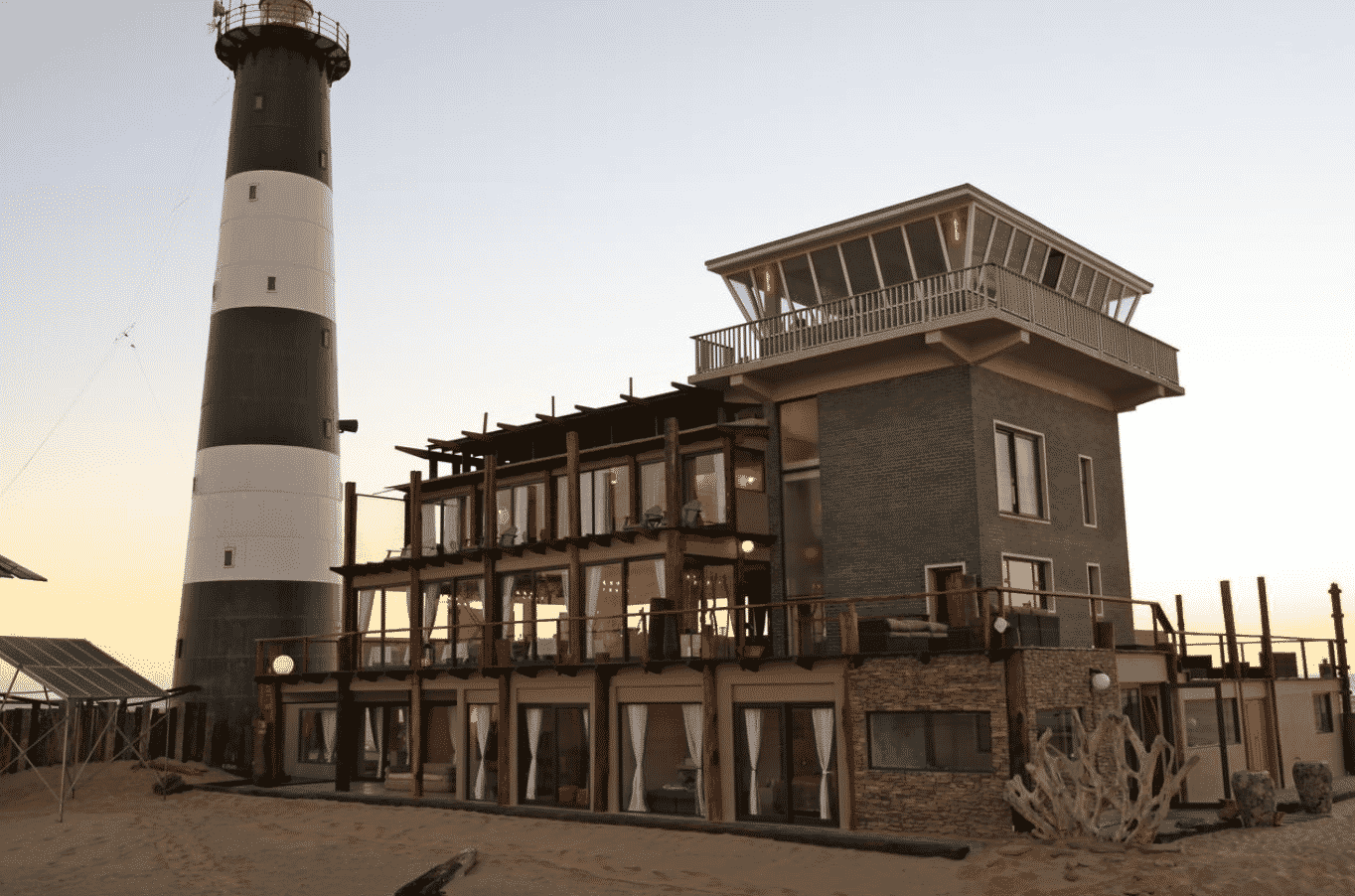
By far the closest accommodation you can get to the wave itself, Pelican Point is the ultimate place to stay. Understandably, it comes at the ultimate price tag too. You’re looking at around USD 430 per night.
Featuring 360 degree views of Walvis Bay Lagoon, the Atlantic Ocean and the beach, Pelican Point Lodge is situated at the foot of the historic Walvis Bay Pelican Point Lighthouse. The rooms are ultra comfortable, and the location is absolutely unbeatable.
Whether you’re a salty surfer balling on a budget, or you prefer the more luxurious things in life, Walvis Bay has great food options available.
There are no supermarkets near the wave itself (You’ll be driving for around 30 minutes on the beach before you reach the wave). Try to stock up on some snacks & food to take along to keep you going on surf days – you’re going to need the fuel.
The currency in Namibia is not the same as South Africa (although the value is the same). They have their own currency, the Namibian Dollar (NAD). The current exchange rate is 1 NAD = 14,71 USD. This puts you in a pretty sweet position and gives you a fair bit of buying power.
Sim cards and data are relatively inexpensive in Namibia. Just purchase an MTC sim card from a supermarket or look out for a guy standing outside the supermarkets selling sim cards for cheaper. Use the machine inside the supermarket or petrol station to buy data. We usually go for the 3gig (1 week) for NAD 60 (around USD 4) – it’s called ‘Aweh Super’.
You’ll be able to buy all of your amenities/ groceries at one of the supermarkets in the city centre, or at the Dunes mall just outside of town.
The Checkers supermarket at the Dunes mall is really good. There’s a wide variety of ready made meals, and fresh fruit & veg to keep you going on long days. Their prices are good, too. We recommend doing a big stock up on snacks/ food as you arrive – you’ll need to take your own snacks & food to the beach during the days, and you’ll kick yourself if you have to drive an extra hour (of valuable surfing time) into the town and back to stock up on food.
Spar supermarket in the town, is always a winner. Their food is generally well-priced, fresh and there’s a decent variety.
There’s also a Shoprite supermarket near Spar which is a bit cheaper, but not usually as good quality.
There are quite a few options for eating out in the town. The town itself has become a popular tourist destination over the past few years, with business travellers visiting often for mining deals, as well as 4×4, biking and nature enthusiasts.
Again, there are loads of options to choose from. These are just a few of our personal favourites.
The Raft
The chicken burgers are SO good here. Expect generous portions and freshly prepared food, with a ‘lekker’ vibe for a couple of post-surf drinks. Good selection of beers and gins. Find out more here.
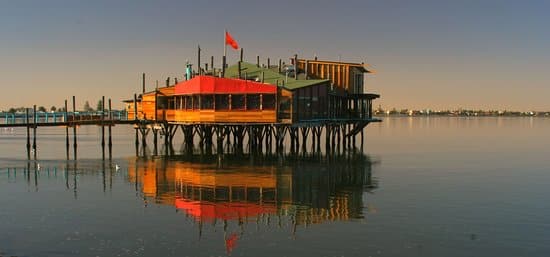
Rojo Pub & Restaurant
Situated at the Walvis Bay yacht club, with a great view. Delicious food, and decent prices. Great pizzas, burgers and seafood. Find out more here.
Anchors @ The Jetty Restaurant
Good option to satisfy your seafood craving. Beautiful location right by the water, good views and relaxed atmosphere. The calamari is a must-have. Find out more here.
Honorable mention
If you decide to take a drive out of Walvis Bay towards Swakopmund (around 40kms), be sure to stop at the food trucks on the beachfront. There’s a food truck called ‘fork n nice’ that serves hands down the BEST deep-fried batter fish and chips we’ve ever had. Relax and enjoy the beautiful ocean view while you devour this budget-friendly treat. Find out more here.
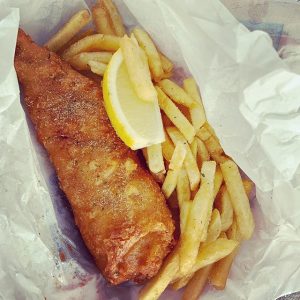
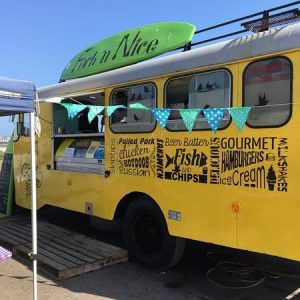
Dunes Mall
There are places to eat at the mall, although it’s a bit less of a vibe and generally the larger food chains. Restaurants you can find at the Dunes mall include John Dory’s (seafood restaurant), Spur (steakhouse & grill), Mugg & Bean (coffee shop), Wimpy or Steers (burgers), Debonaires (pizzas).
The best coffee shop we have found in Walvis Bay is Slowtown Coffee Roasters. Freshly roasted Namibian artisan coffee & excellent service. You’ll want a decent coffee after a full-on morning of the best waves of your life! The waitress at Slowtown had even remembered our order, after our second visit – what a legend! Here is the location.

So you’ve spent a shit ton of money to get to Walvis Bay, rent a car, book accommodation and more. The up-side? Beers are cheap! You’ll be pleasantly surprised. Our favourites are Tafel, Windhoek and Camel Thorn (craft beer). A store bought beer will set you back about USD 1 or less.
Skeleton Bay Namibia is one of those marvels of the surfing world, and has been a buzz since Cory Lopez put the insane left-hander on the map a decade ago. Known as the longest barrel in the world, it’s the place surfers daydream about. But you know that, that’s why you’re reading this.
Koa Smith makes riding this wave look way too easy in his videos:
That’s why we think it’s very important to highlight that Skeleton Bay is not suitable for beginner/ intermediate surfers. This wave is best enjoyed as an advanced wave-rider.
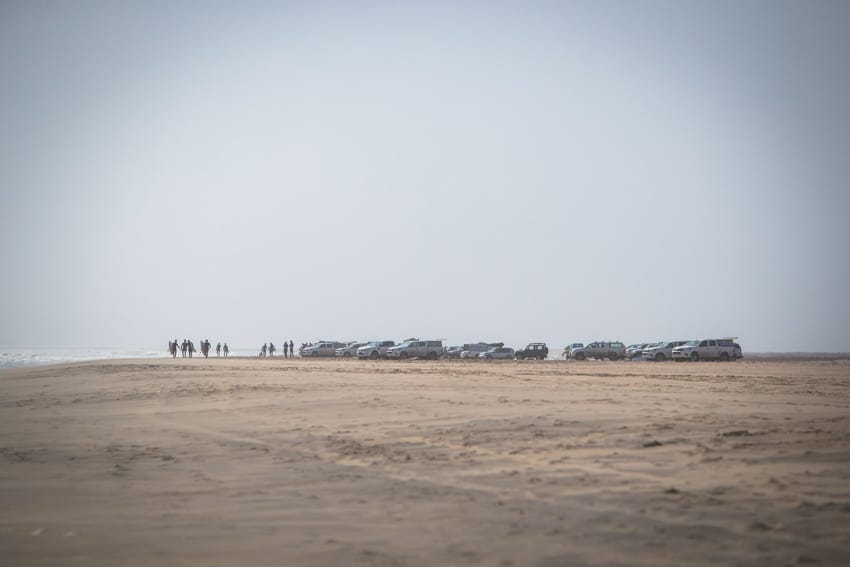
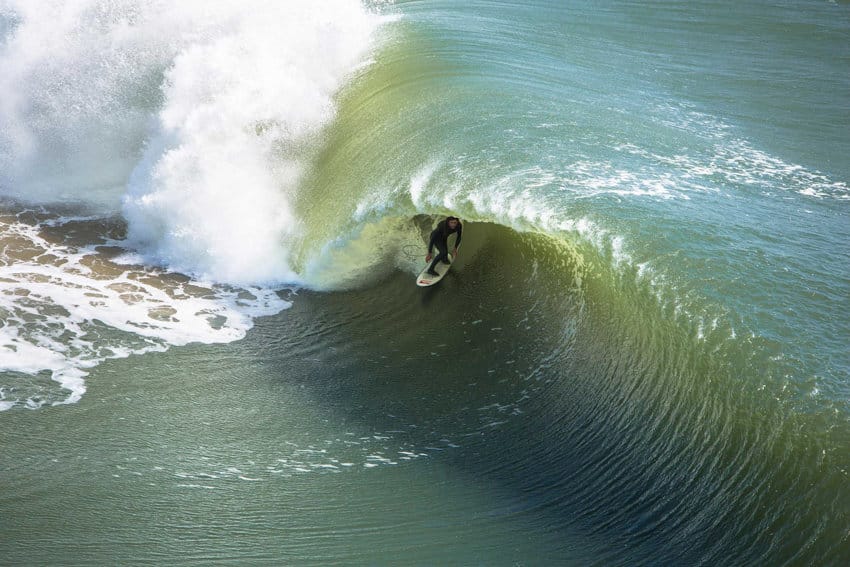
?It was like six-foot Teahupoo, but two miles long with absolute perfect conditions… the best waves I’ve witnessed in my life. It’s hard to believe that a wave can be that good, it’s like playing a video game or some shit. You honestly need to see it in person to understand how good it is.” – Billy Kemper
“All the flight cancellations, delays, money spent and travel complications are forgotten when you get to this beach. It’s been a wild week but it was all worth it.” – Benji Brand
“My first walk-around was in the dark and my last walk-around was also in the dark. I think I only took a 30-second break the entire day. It’s definitely the most exhausting day of surfing I can imagine. But, you know, some people train for contests or big waves. I train for Namibia. Even if it’s only one day a year. But after this day, I think I need to change my routine slightly. I’m still so sore.” – Koa Smith
We’ve been doing surf trips up to Skeleton Bay for 3 years now, and each time our minds have been blown. You literally go to bed at night wondering if what you witnessed at the beach that day actually really happened – or if it was some type of surfing dream your mind created.
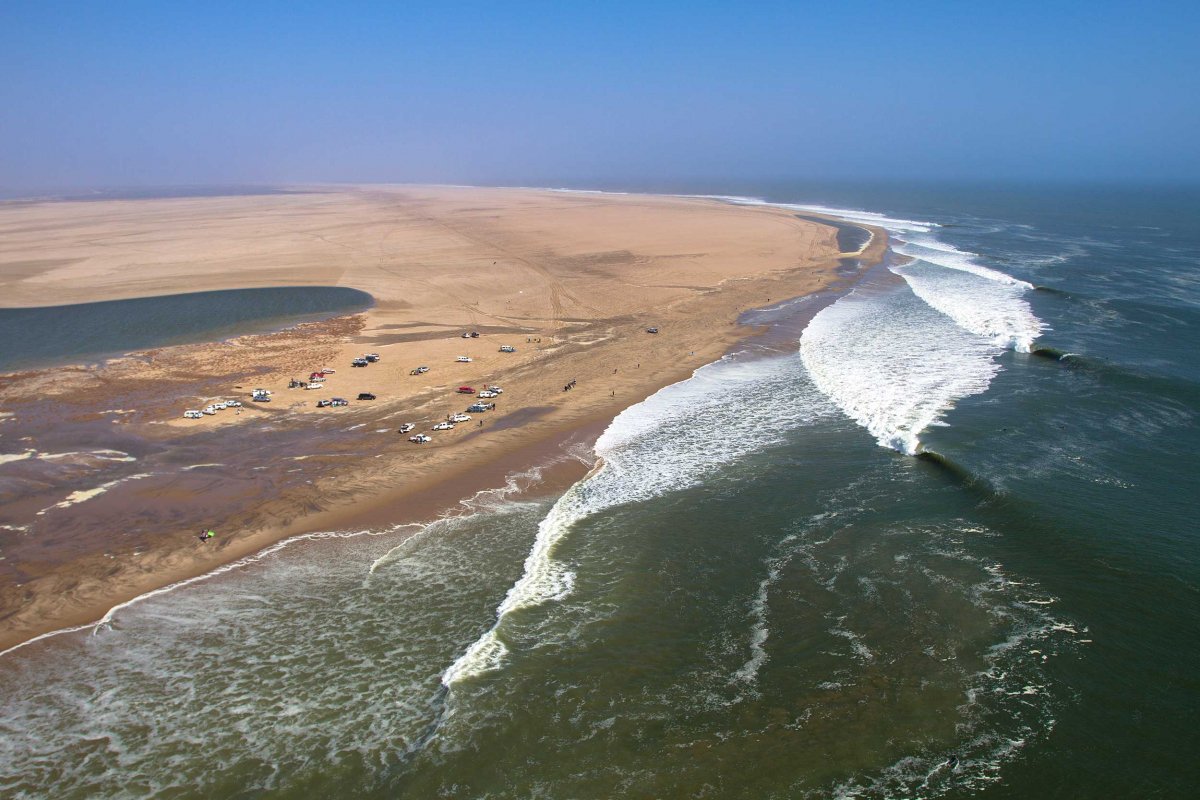
We asked one of our experienced guides, Ru, his opinion on the wave:
It’s better. Every good wave that you’ve ever seen in your life will immediately be replaced by the view of a wave that barrels so long that it literally runs out of your sight. Once you get a good one, the view out of the barrel will be burnt into your memory for a lifetime. That’s the reason we return time after time, and I don’t think I’ll ever stop going. There is no other place in the world that can mimic what this wave does. I think the fact that it works so rarely also just makes it that much better. When you score it, it’s experiencing one of the greatest wonders of nature that the world has ever produced.
It’s heavier. I can’t stress this enough. I’ve travelled to some heavy waves around the world, and nothing has come close to matching the power of this wave. This year I was given a real wake up call when the shock wave instantly blew my eardrum. It’s important to be at your peak fitness to have a good time. It’s definitely a humbling experience, because you’re guaranteed of a beating on every single wave.
No shit. It’s a bit of an obvious one, but surfing is the best way to prepare yourself for a big surf trip. Try to get into the water most days before you head off (you’ll basically be on standby between May – September, and will want to be at your peak fitness level). Surf as many lefts as you can.
Concentrate your workouts on your core. Targeting your back, abs, legs, shoulders and arms. They are about to take an absolute beating on this Skeleton Bay surf trip. Getting them prepared will serve you well and will enable you to catch more waves and your sessions to last longer. Be careful not to over do it. Start small and work your way up gradually increasing your intensity and stamina. (Credit: Wordsurfaris)
The distance from the top of the point to the bottom is about 2km. The quicker and more comfortably you can run up and down the beach between sessions, the more time you’re in the water, and the more chance you have of scoring the wave of your life.
Yoga is amazing for strengthening your core and making you more flexible which is perfect for surfing. This will also help your muscles recover quicker after your intense surf sessions at the Donkey.
Mental preparation is as important as physical preparation. Get yourself in the zone. Get excited & embrace the journey (even if it turns out to be 50 hours in transit). Every surfer’s mental preparation is different. Some turn to music, others turn to podcasts, journaling or watching videos to amp them up. Do whatever works for you. A positive mindset and high froth levels will only do you good on a trip like this.
One of the questions we’re asked most often on longer surf trips in Walvis Bay is “What else is there to do here?”. When visiting Walvis Bay for your surf trip, don’t expect a Bali-type buzzing town with socialites sitting at beach side bars and bustling nightlife.
Although the town itself has developed rapidly over the years, it’s still a simple coastal town. As mentioned in the food and amenities section of this platform, there are loads of good restaurants/ cafe’s and a few shops to choose from.
If you’re more of a nature-lover or adventure seeker, however, you might want to venture a bit further out to find some real gems on your non-surf days (if you have any).
Take a short 10 minute drive to Dune 7. You won’t have to pay any entrance fees, and you don’t have to participate in one of the ‘Dune 7 Adventures’ to enjoy the dune. Pack some beers in a backpack and take a walk up the dune for a bevvy with one heck of a view. Our favourite beer to drink at Skeleton? Jack Black’s Skeleton IPA. Unbeatable!
Keen to get active in the dunes? Try your hand at sand-boarding or quad-biking with the help of Dune 7 Adventures. You won’t need to book far in advance (they fit us in with just a few hours notice). The guides were very friendly – they even used the natural iron in the dunes to create sand-art for us.. pretty mind-blowing.
Here are the prices for Dune 7 Adventures:
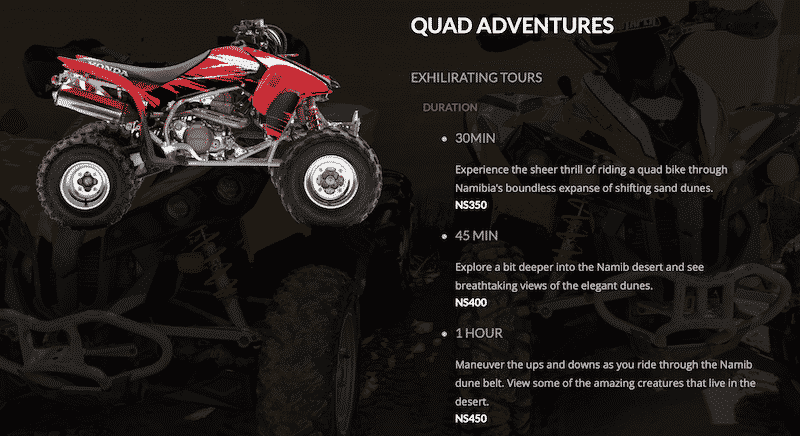
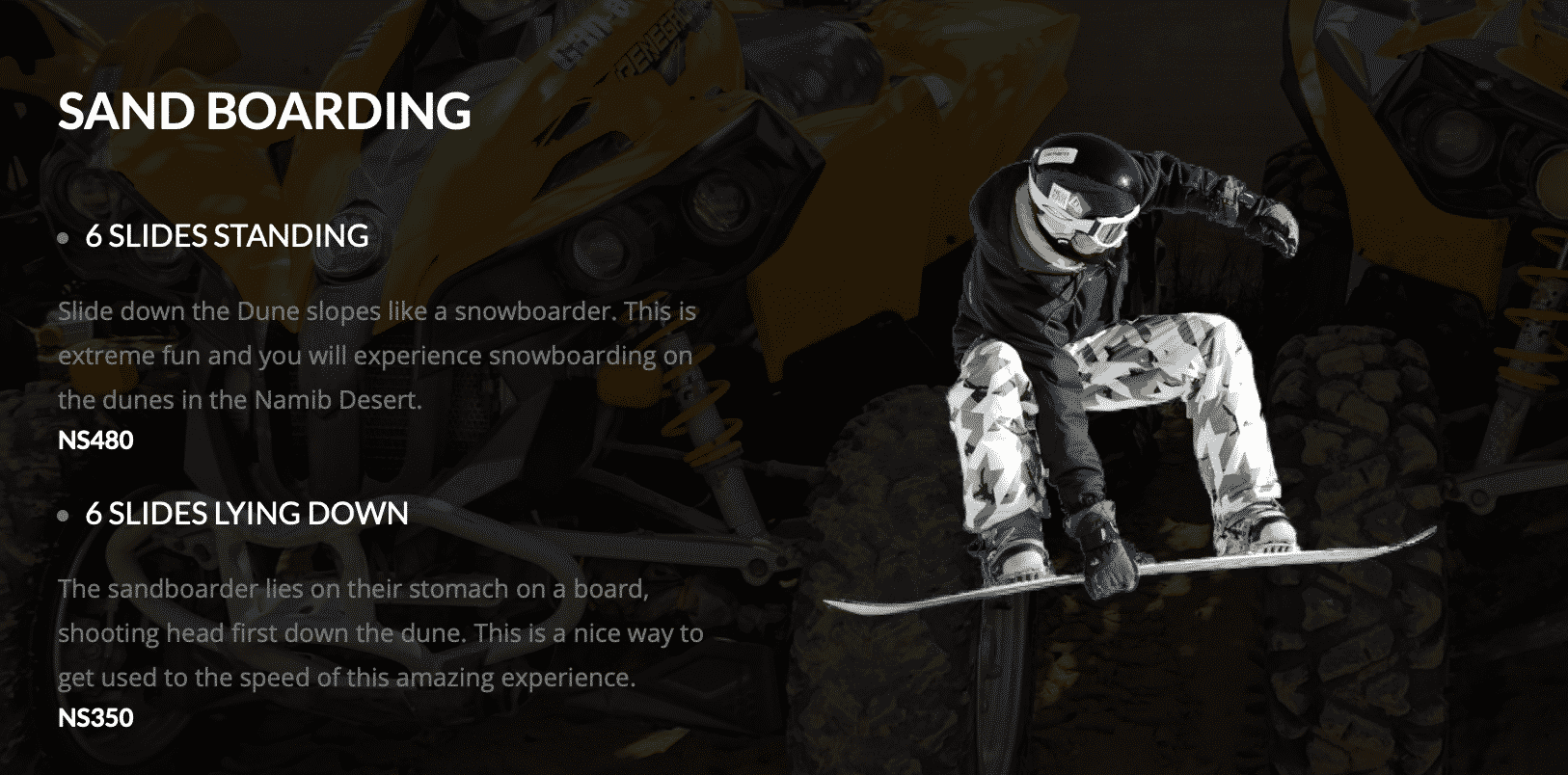
Full disclosure, we haven’t actually done this one. We’ve heard it’s great, but we’re not 100% sure whether we’re ethically opposed to it or not. The best place to go is in Swakopmund, to the Swakopmund Camel Farm. You’ll pay R200 (or USD 15) for a 20 minute camel ride.
Daily departures from the Waterfront in Walvis Bay in search of the ‘marine Big 5’. The catamarans depart at 09h00 (check-in 08h30) every morning from the Jetty at the Walvis Bay Waterfront for a marine educational sightseeing tour in the bay area in search of the marine big 5: Whales, Dolphins, Mola, Leatherback turtles and seals.
While serving hot coffee and tea, the initial route takes you past oyster farms to Pelican Point with its landmark lighthouse and 60,000 resident Cape Fur Seals. In season (July to November), larger mammals such as the Southern Right Whale and Humpback Whales are often spotted. Bottlenose, Heaviside and Dusky dolphins are regularly seen, as are Mola Molas and Leatherback Turtles. Your journey from Pelican Point takes you past some of the more interesting ships and oil rigs in the bay as you are served fresh oysters with sparkling wine, savoury snacks and desserts.
Waves not working at Skeleton? Why not check out a few other waves with an experienced local guide. Oliver from Salty Jackal offers daily surf guiding between Swakopmund and Walvis Bay at very affordable prices. Get in touch with him here. He’s a great guy!
Situated in the largest conservation area in Africa (the Namib-Naukluft National Park), Sossusvlei is possibly Namibia’s most spectacular and best-known attraction. It is about 5 hours South of Walvis Bay. Characterised by the large red dunes that surround it, Sossusvlei is a large, white, salt and clay pan and is a great destination all year round. The dunes in this area are some of the highest in the world, reaching almost 400 meters, and provide photographic enthusiasts with insane images.
Despite the harsh desert conditions in the area, you can find a wide variety of plants and animals that have adapted to survive.
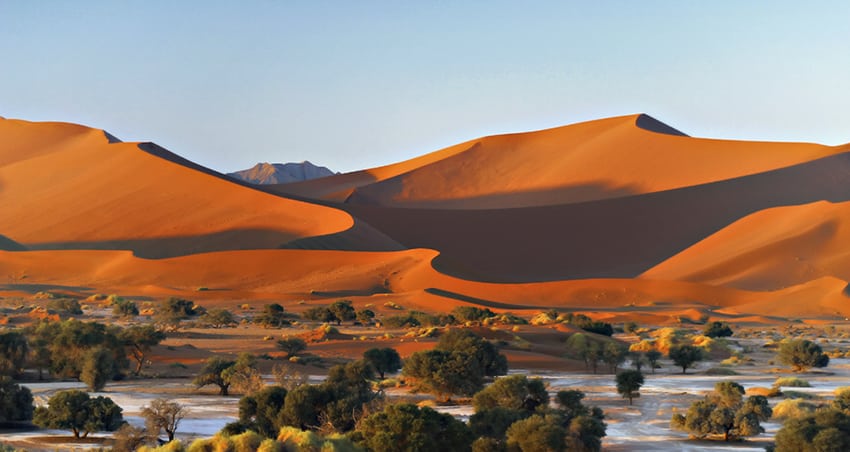
Sandwich Harbour, part of the Namib Naukluft Park, is a place many have heard of but very few have ever visited. The lagoon, salt pans and the bird sanctuary, which form the Walvis Bay Wetlands, are rightly heralded as the single most important coastal wetlands of Southern Africa. It is one of five Ramsar sites in Namibia. Giant sand dunes run straight into the ocean, creating breathtaking sceneries and unique landscapes.
A 4×4 tour with Sandwich Harbour 4×4 can last between 4hrs – 6h30mins and starts at USD 112 per person. You can book here.
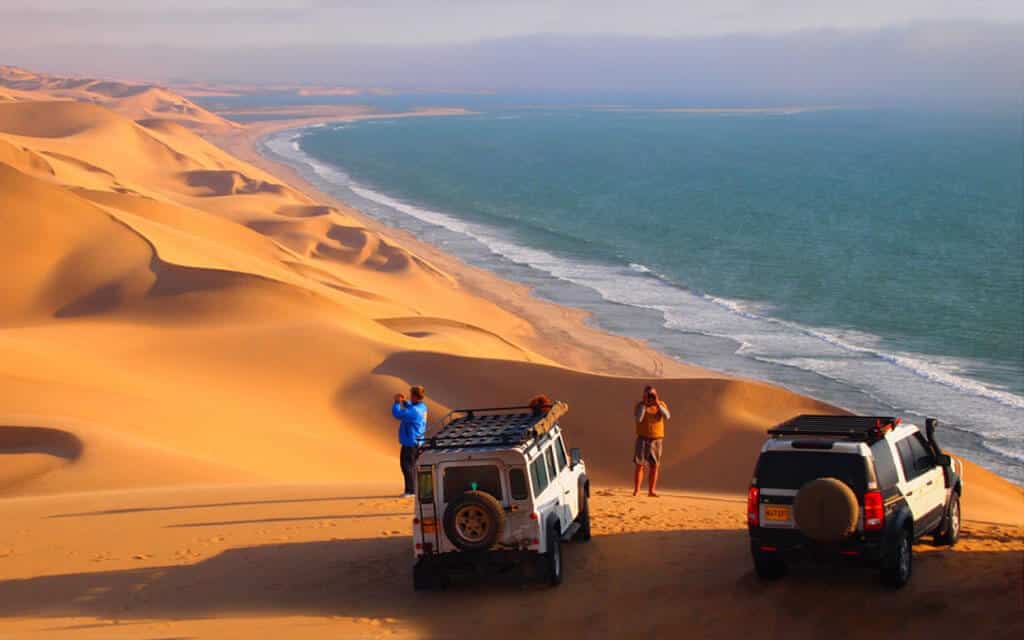
You’ll probably see plenty of seals and dolphins on your surf sessions. If not, go kayaking amongst seals and dolphins on the protected side of the isolated pelican point peninsula – join Pelican Point Kayaking on their daily departures from the Walvis Bay Waterfront. The price per person is around USD 55 for a half-day tour.
Preparation is key for a last-minute Skeleton Bay surf trip. Ensure you have all your ducks in a row before you leave, and the trip will be a breeze. Here’s a checklist we use before we leave for our Skeleton Bay surf trips.
It’s important to bring everything you need, and nothing that you don’t need. Chances are, you’ll be travelling for 20 hours +, and the lighter you pack the less you have to weigh you down between flights and when trying to get from the airport to your accommodation etc.
Courtesy of @Sufer Magazine , here are some tips for packing your board bag.
“There’s nothing more disheartening than opening up your board bag upon arrival only to find that your boards have fallen victim to baggage handler malpractice. With the sadistic approach the airlines take to transporting your boards, you’ll need every tool at your disposal to ensure that they arrive safely and in one piece. Here are five tips on how to pack your board bag.
The most ingenious inventions are often the most simple. Before you begin packing your board bag, head down to your local hardware store to pick up some foam tubing. Grab a few feet more than the length of the boards you’re packing. With a razor blade, cut down the middle from the bottom of the tubing towards the top, stopping a few inches before you get to the top. Take the tubing and secure the uncut end to the nose of your board and grip the open two ends to the rails of your board. The rails of your board can now stand up against just about anything the airlines throw at them.
Always stack your boards correctly. Your bigger boards should always go on the bottom (wax side up), and your smaller boards on top. Always keep the rocker in unison and the boards facing the same way.
If you’re packing a board with glass-on fins, you can approach protecting them in two ways: you can either pack them individually, wrapping each fin in two or more layers of bubble tape, or you can buy a foam fin box. If you’re packing a board with removable fins, remove them.
Always strap your boards together. Most good bags will come with straps, but if they don’t, you can always use a couple of leashes instead. When you’re stacking your boards, ensure that you use a towel between the deck and bottom to protect yourself from waxing the bottom of the boards. Keeping your boards strapped together will not only lessen your chance of picking up a ding while your boards are in transit, but it can throw off the prying eyes of a ticketing agent, making it look like your traveling with less than an entire quiver.
For an extra layer of padding, evenly distribute assorted soft gear throughout the bag. Pillows wrapped abound the nose and tail work wonders. Westuits and towels placed along the decks not only add an additional layer of padding, but it’ll also save you a bundle of money by not having to check another bag. Throwing boardshorts and T-shirts into the mix never hurt either.”
Does planning a Skeleton Bay surf trip still sound like a bit too much of a mission? Take the easy route by booking a fully-guided surf trip package with us.
Our Skeleton Bay Strike Mission Surf Trips include the following:
Get in touch below to find out more about the pricing for this trip, and how to secure your spot on a fully guided Skeleton Bay Strike mission with South Africa Surf Tours.

Please read our disclaimer here:
If you require any more information or have any questions about our site’s disclaimer, please feel free to contact us by email at info@southafricasurftours.com
All the information on this website – southafricasurftours.com – is published in good faith and for general information purpose only. South Africa Surf Tours does not make any warranties about the completeness, reliability and accuracy of this information. Any action you take upon the information you find on this website (South Africa Surf Tours), is strictly at your own risk. South Africa Surf Tours will not be liable for any losses and/or damages in connection with the use of our website.
From our website, you can visit other websites by following hyperlinks to such external sites. While we strive to provide only quality links to useful and ethical websites, we have no control over the content and nature of these sites. These links to other websites do not imply a recommendation for all the content found on these sites. Site owners and content may change without notice and may occur before we have the opportunity to remove a link which may have gone ‘bad’.
Please be also aware that when you leave our website, other sites may have different privacy policies and terms which are beyond our control. Please be sure to check the Privacy Policies of these sites as well as their “Terms of Service” before engaging in any business or uploading any information.
By using our website, you hereby consent to our disclaimer and agree to its terms.
Should we update, amend or make any changes to this document, those changes will be prominently posted here.
